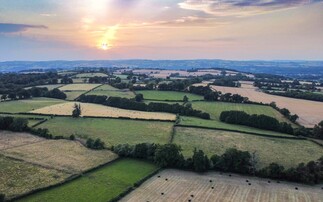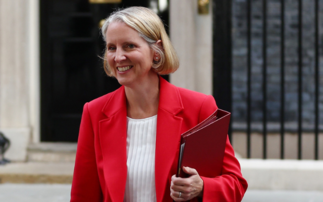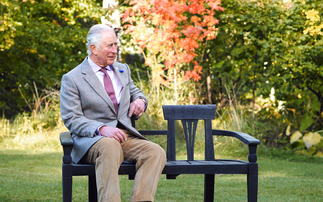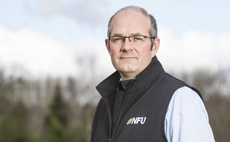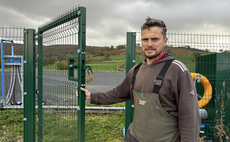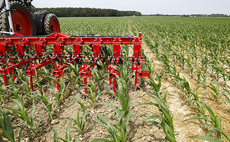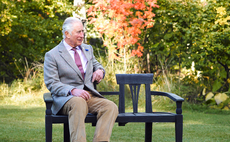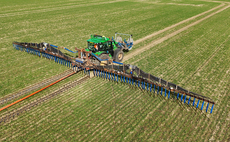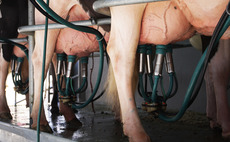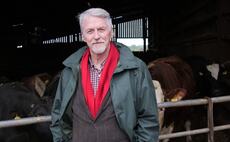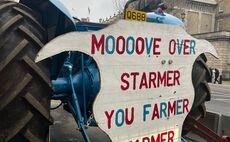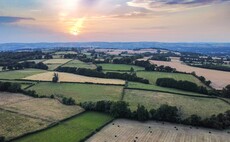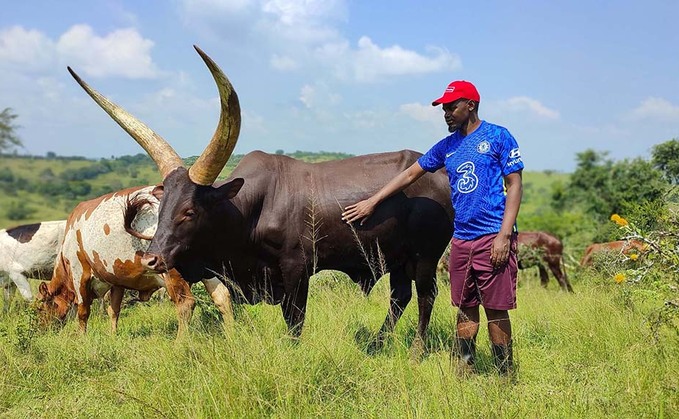
With a passion for learning, African farmer Baker Bakashaba has grown his farming business and taken to social media to learn and share information with farmers from other countries. Emily Ashworth finds out more.
Baker Bakashaba was born and raised literally, he says, by cows. Now rearing native Ankole cattle, which are a rather impressive sight with their considerably large horns, Baker has made a name for himself by sharing his story on Twitter to his 36,000 followers.
Farming at Novine Farm in the heart of Uganda, Baker, 37, has always been determined to farm in his own right, despite qualifying as a doctor.
His parents ran cows, goats and chickens, and grew crops such as bananas and potatoes. When Bakers parents sadly passed, the income from the farm allowed him and his siblings to stay in school.
He says: I would spend all school holidays helping out at the farm. I learnt all that there was to learn.
Even when I graduated as a medical doctor, I was determined to continue farming, partly because of the love for it, but also because I know that it is one of the sustainable ways to sustain wealth and continue the family legacy.
By the time I finished university and started working as a doctor, the cows at our family farm had dwindled because they were used to support tuition for me and my nine siblings.
In fact, by January 2014, only one cow remained from the peak of 140. That cow, named Ihinda, was given to me as a gift by a family friend and great man, the late Major General Benon Biraaro on my graduation. I was motivated to build a herd around it.
I decided to begin restocking and vowed to build back the herd to surpass our previous peak. We surpassed it and I had to look for extra land for expansion that is how I came to establish Novine Farm."
Baker now runs two farms, in Isingiro and Kassanda, where the landscape is generally flat and the pastureland is dotted with acacia trees and other natural tree species, which provide much needed shade for the cows during the hotter months of the year.
He runs over 250 cows now, all of which are a mix of breeds including Ankole Longhorn and Ankoles crossed with Ayrshires or Holsteins.
The traditional Ankole are hardy, resistant to tickborne diseases, tolerant to hot conditions and can thrive on low pastures.
He says: They have excellent quality milk with a very high butterfat content.
The crosses produce more milk in terms of volume and have a faster maturity rate. They are relatively hardier and disease resistant than the purebred Ayrshires or Holsteins.
We supplement the milking cows with silage and hay from the fodder that I grow. This includes Napier grass, Rhodes grass and maize.
I use bulls for breeding. I have not started using artificial insemination yet but I plan to do that, especially to target improvement of the Ayrshires.
Baker sells cows directly from the farm or to specific clients and delivers to various parts of Uganda. They are mainly grazed on natural pastures because, says Baker, Uganda is blessed to have a good, warm climate with two rainy seasons in a year which allows pasture growth throughout the year.
He says: The climate in most parts of Uganda is very conducive for farming with plenty of rainfall that comes in two rainy seasons March to June and September to December.
Almost 70 per cent of households in Uganda are involved in farming, although most are smallholder farmers in subsistence production.
Major challenges include fluctuating milk and beef prices which Baker says usually end up hurting the farmers lack of access to capital to expand farm operations to a commercial scale, low level of mechanisation, poor quality drugs and a shortage of vaccines on the market which makes disease control difficult.
UK farmers can undoubtedly relate to the rise and fall of dairy and beef prices, but there are core differences to farm operations in his country.
From what I have observed from the several videos on YouTube that I have watched and the engagements on Twitter, I realise that there is greater level of mechanisation on farms in the UK which makes them less reliant on manual labour, he says.
Secondly, there is a lot more commercialisation of farm operations in the UK, with most farms having large herds unlike the many smallholder farmers here in Uganda.
There is greater level of on-farm value addition in the UK too, with many farms able to produce UHT milk, yoghurt, cheese and butter on the farm. This allows the farmers to get more value from their products.
Lastly, I think there is more Government support towards farmers with subsidies and other incentives that allows farmers to expand their operation in the UK. In Uganda, farmers are generally more reliant on their personal initiatives.
Although farming is a huge passion, Bakers career as a doctor sees him head up a project that provides care and treatment to HIV and TB patients. The farm is his perfect getaway.
He says: I also love the fact that my children Adrian, 10, and Noella, 4 enjoy being at the farm and are learning to take care of animals. I feel that they will be able to take it up after me. That fills my heart with so much joy.
It gives me a peace of mind I do not get from anything else. I just need a few minutes at the farm and my mind will be relaxed, no matter how hectic the week has been.
Sharing his story is also important his Twitter account has exploded, and his thousands of followers enjoy his insight into farm life in Uganda. But, for Baker, it is also about connection and learning; revelling in the sharing of information from farmers across the globe.
Through the Novine Farm Twitter account, he hopes young people will feel inspired to take up the beautiful career of farming.
I am glad that so many have reached out from all over Africa, stating they are learning so much from what I share and many have decided to start their own farms, he says.
I provide technical assistance and advice freely, and link them to places where they can be assisted or access what they need like cows or goats as well as farm inputs.
Through engaging with farmers from all over the world, I have been able to learn new skills and acquire knowledge that I have applied to improve my operation.
I think it is growing in popularity because I share real life experiences that I encounter at the farm, and many people can easily relate to those and learn from them. I share and engage regularly which keeps the followers interested.
I try to share photos whenever I tweet, and they keep the followers visually engaged it makes them feel like they are part of the farm.
He is a huge advocate of exposing farming as a potential career just like in the UK, farming needs to be put in front of young people to ensure they know it is a potential vocation.
Of course, farmers are needed to feed the growing population as sustainably as possible, says Baker, but farming can also provide young people with core values.
Jobs are scarce on the African continent. Farming can be a good way to meaningfully engage the youths in production," he says.
I also know that the values one develops from working on the farm like hard work, patience, resilience, empathy for animals and love for the environment are key for humanity.
In my career as a farmer and a medical doctor, I strongly believe in life-long learning. I look at experiences like sharing my story with UK farmers as yet another opportunity to learn and be better.
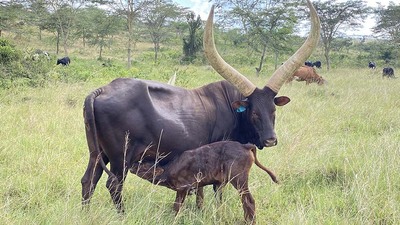
Farm Facts
- Runs a herd of Ankole cattle (native to the country), some of which are crossed with Holsteins and Ayrshires
- Uses a bull for breeding but is hoping to move to artificial insemination
- Cows, which are all mainly pasture-fed, are sold directly from the farm, or to specific clients
- Social media account has over 36,000 followers and is used to share farming information alongside his farming life in Uganda








